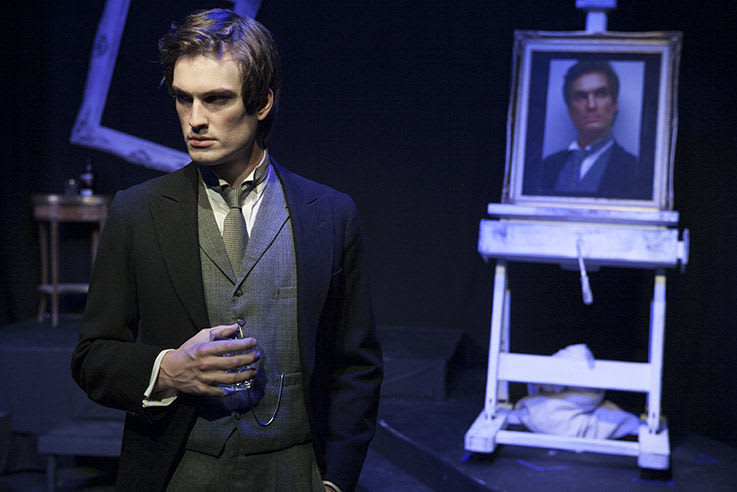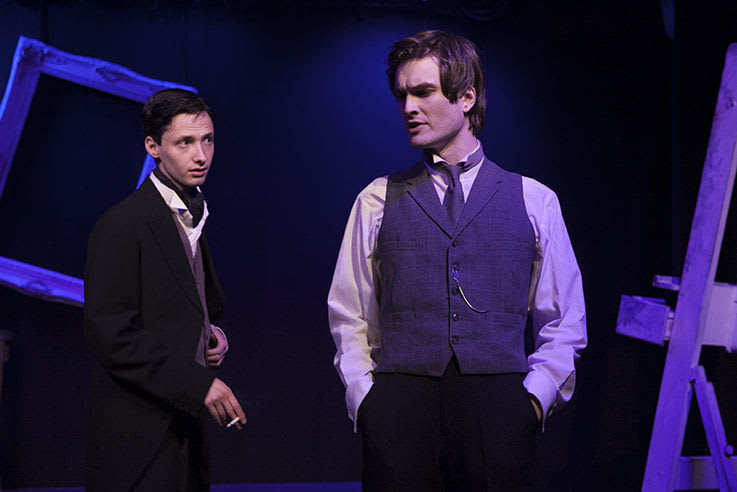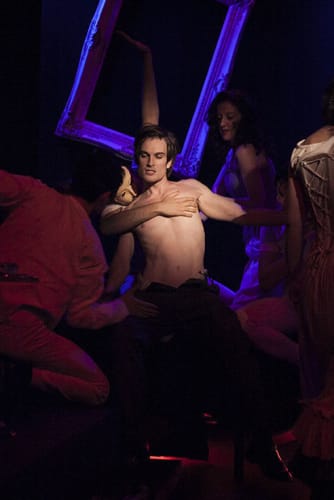This is not just another adaptation of Oscar Wilde’s notorious novel, of which there have been several recent stagings.
It sets out to do something different, though clearly drawing directly on the main incidents in The Picture of Dorian Gray, the story of a man whose dissolute life leaves no mark on his person but turns his youthful painted portrait into a thing of horror.
Dramatist Dechanel has declared that he set out explore the themes of seduction, experimentation and personal growth, concentrating on how Dorian really changes from a naïve and innocent teenager into the smooth-faced but corrupt older man. His aim has been for theatregoers ”to experience everything with Dorian: his guilt, shame, ecstasy, fears, even his mental health issues.”
In some ways the scope of this play is more faithful to the original novel than those adaptations that have concentrated on the story of Dorian and young actress Sibyl Vane. It makes explicit the homosexual elements that are implicit in the book but not described, and adds some new material and characters, but it true to the ideas behind Wilde’s story.
Dechanel makes a point of Dorian’s originally unblemished character and youthful innocence. Appropriately good-looking Michael Batten establishes his character with a bashful charm before he succumbs to the corrupting influence of Will Harrison-Wallace’s Lord Henry Wooton and his muscled torso takes on as much importance as his handsome face.
We may see this Dorian indulge in deviance and deal death, but Batten suggests that even as he misuses others there is a conscience there that knows he’s doing wrong. Director Simon James Collier, with help from James Corner’s sound design, acknowledges the guilty tensions in his head.
Harrison-Wallace gives Lord Henry the warmth and smooth tones of a charmer, a man who is good company, even if he’s a little too fond of Wildean epigrams. His sociability masks the fact that he’s a parasite on others. Polite society seems to see his hedonism as a pose. Those who have knowledge of the world to which he introduces Dorian would never admit it, though others might scandalously gossip about them.
In contrast to Lord Henry’s worldly confidence is Basil Hallward, the painter of Dorian’s portrait (though he prefers to be called an artist). Loz Keystone makes him a gentle, caring character, a young man not yet established in his profession. Though he is clearly dotty about Dorian, he wouldn’t risk doing anything about it, while Dorian responds to every temptation Basil resists, or maybe never recognizes the opportunity.
Actress Sybil Vane, first of those Dorian so grossly misuses, has no such resistance. I’ve never quite understood Wilde’s concept that when she falls really and deeply in love she loses the ability to act love. She is a cipher in the plot here and, though Elizabeth Bryant gives her charm, she has little opportunity to offer more.
She gets a much more satisfying role later as Jane Wooton, Sir Henry’s daughter, whom Dechanel makes the object of Dorian’s real affection, a suffragist and new woman, a modification that gives the play an extra edge.
Simon James Collier’s direction is swift-moving, smoothly overlapping scenes and establishing changed location by minimal means. The characters are played naturalistically but there is an element of stylisation—including the artist’s easel, ever-present, as a reminder of the putrefying portrait, though it does not really solve the problem of the portrait’s alteration.
Nevertheless, this is a clear retelling of Wilde’s story that works as theatre. It makes explicit things unmentionable when the novel was written. Indeed, it slightly overdoes the orgies; being so specifically raunchy while still trousered seems excessive. It is lucky that Batten has such well-developed pectorals for, spotlit, they become significantly symbolic.
There is just a hint of exploitative titillation but that is not what this production is about. It is a moral tale that lets us follow the primrose path with Dorian, inevitably awakening echoes of Wilde’s own story in his epigrams, quoted or simulated, and in its movement between conventional Society and an underworld, and in a presentation of desires that can be both blessedly exhilarating and damning.


